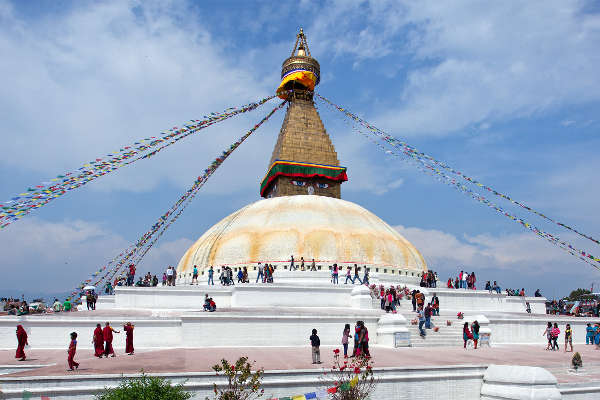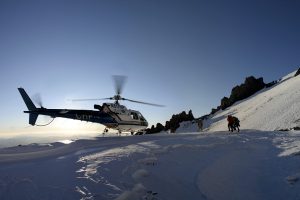The Kanchenjunga Base Camp Trek provides unsurpassed views of snow-capped mountains. The forests of rhododendrons are also enchanting and there is much wildlife to be seen. The area is one of 200 recognised by the World Wildlife Fund as a global ecoregion – one of the Earth’s most biologically outstanding habitats. A quarter of Nepal’s red pandas live in this region.
On this page, you will find a comprehensive and impartial guide to the Kanchenjunga Base Camp trek.
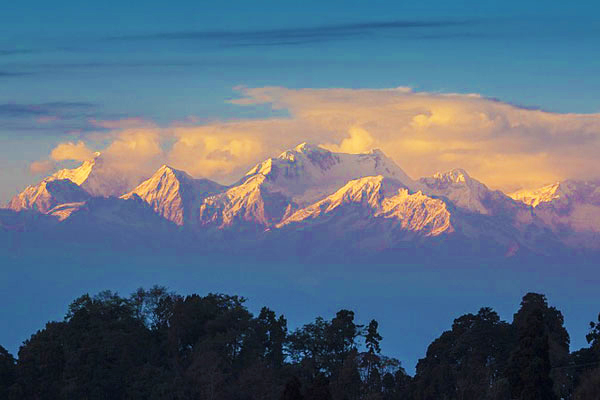
Kanchenjunga Base Camp Hike
Kanchenjunga, meaning “five great treasure houses of the snow,” is the third-highest mountain in the world and the second highest in Nepal. Until 1856, it was believed to be the highest of all.
The Kanchenjunga hike is one of the longest treks in Nepal, taking from 23 to 29 days. It is possible to make this a tea house trek, as the government has encouraged the building of infrastructure around not just Kanchenjunga but all of the Himalayas. However, in Lhonak, Kambachen and Kanchenjunga Base Camp, lodges only open when there are more trekkers.
The avalanches that can erupt on Kanchenjunga are widely believed to be the largest found anywhere in the world.
Kanchenjunga Regional Map
Kanchenjunga, one of the least-populated regions of Nepal, is on the country’s eastern border, next to India.
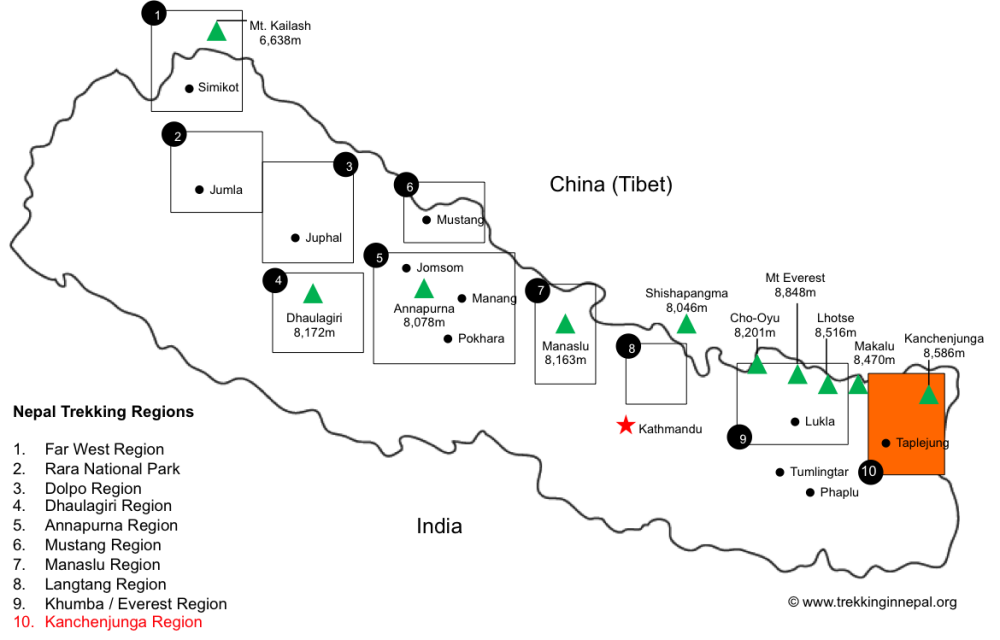
Recommended Kanchenjunga Map
We recommend the following map - A Trekking Guide to Kanchenjunga (Himalayan Travel Guides.
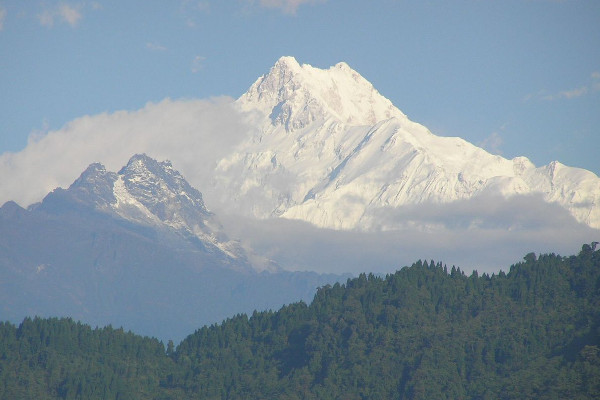
Kanchenjunga Base Camp Trek Itinerary
Below is a detailed Kanchenjunga Base Camp Trek itinerary.
Please note that there are several Kanchenjunga trek itineraries that can be done. Below, we have laid out the most popular version – 28 days, leaving from Kathmandu.
Day 1-2
You will arrive at Kathmandu’s Tribhuvan International Airport and transfer to a hotel. Kathmandu is brimming with attractions. A major one is Boudhanath Stupa, one of the largest Buddhist shrines in the world. Another is Pashupatinath, the country’s most famous Hindu temple, where you can see sadhus (holy men) meditating, pilgrims bathing and sometimes funeral pyres ablaze. Another site is Bhaktapur Durbar Square, a medley of pagoda and shikhara-style temples surrounding a 55-window palace constructed of brick and wood.
I recommend checking out my article on the best things to do in Nepal, which includes lots of attractions in Kathmandu.
Day 3
You will take an afternoon flight to Biratnagar which lasts for 40 minutes.
Day 4
Another flight, this time lasting 30 minutes, transports you to Suketar Airport in Taplejung. In the afternoon, I recommend you get some exercise: an easy walk of two or three hours can be had along the ridgeline to the grazing area of Lali Kharka. You will most likely be camping from now until you return to Kathmandu.
Day 5
You will traverse the hillside for a short distance and then descend to the village of Pakora on the Phawa Khola. You will cross a suspension bridge prior to a steep climb that heads for Kunjuri. After lunch, the campsite at Khesawa is not far. Here, you are presented with your first views of Kanchenjunga. The south and main summits and Kangchenjunga West, otherwise known as Yalung Kang, ought to be visible.
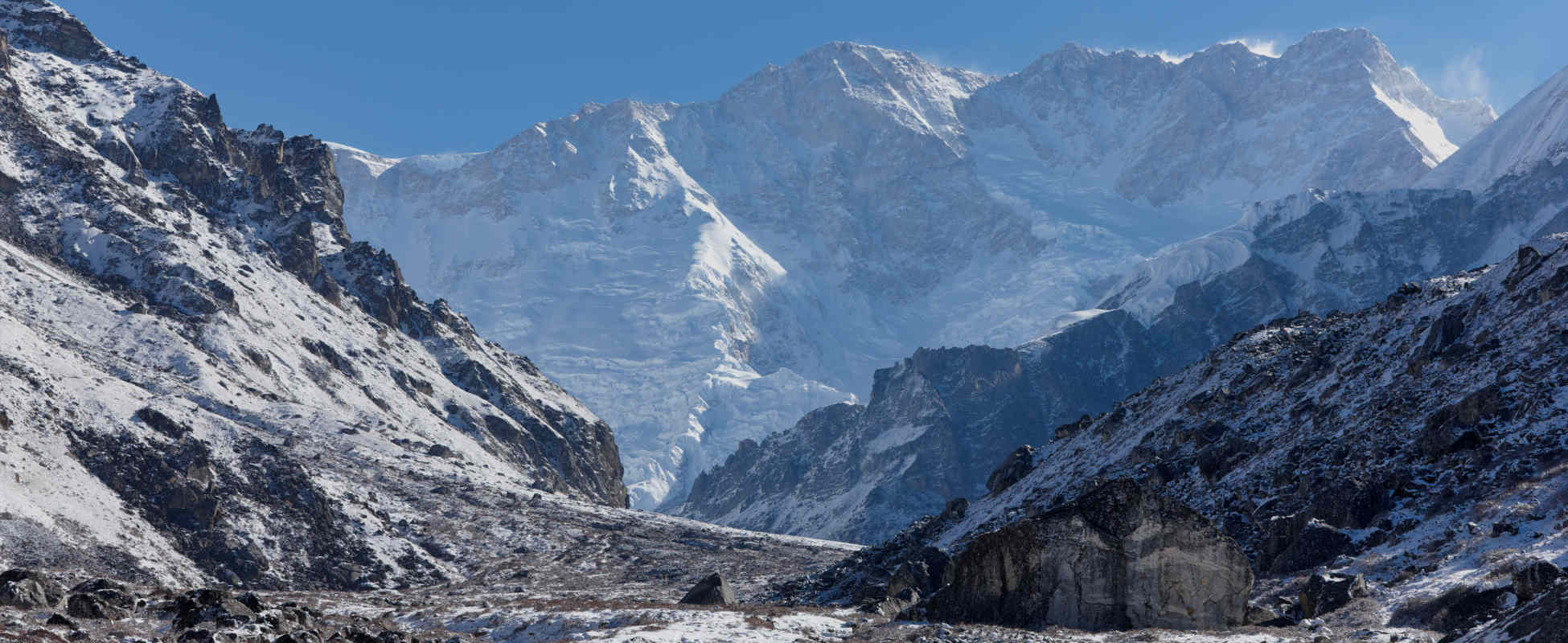
Day 6
Today, you will cross steep hillside far above the Kabbeli Khola. There are ups and downs but no shortage of shady places to rest. Following lunch, you will pass the village of Anpan prior to descending to cross the Kashawa Khola. Then it is time to climb once more, through terraced fields to the village of Mamankhe.
Day 7
Walking begins with a gentle climb on a track above the Kabeli Khola. The path undulates as it passes ridges. After that, the ground is mostly flat. Eventually, the river becomes level with the trail, after which there are a few hours before Yamphudin is reached. This is the last village you will see before Ghunsa. This charming place is found below the ridge at Deurali Danda, which you will cross, and then the tent comes out.
Day 8
Leaving Yamphudin, you will find yourself on a trail that ascends a steep spur, a sight to which you will grow accustomed. You will trek through pleasing forest. Lunch is in a meadow with a grand view to the north and south. A sharp drop to a river brings you to an interesting bridge over the Omje Khola and then your campsite at Chitre.
Day 9
Your day begins with three hours ascending steeply to the crest of Deurali Danda, mostly through dense forest. You will arrive at a pass from which you can see Jannu. You will descend across steep and exposed areas and then go back into the beautiful forest. The path goes down the the valley of the Simjua Khola. You cross a very interesting-looking wooden bridge to reach Tortongn, where numerous rock shelters provide places to camp.
Day 10
You will follow the river through more beauteous forest, with conifers giving way to rhododendrons. The valley climbs steeply and as the day progresses, trees become increasingly stunted and scattered. In the distance, you can see snow-capped giants. Just before you get to Tseram, the mammoth heights of Kabru and Rhong peaks come into sight. Tseram, where you stay, is a grazing area. The temperature at night is a reminder that you are really gaining height.
Day 11
In the run-up to Ramche, the scenery is marvellous. You will pass the snout of Yalung Glacier, where there is a series of ablation valleys which make for easy walking. The highlights of this stroll are clear streams, a frozen lake and views of Kabru, Koktang and Rathong.
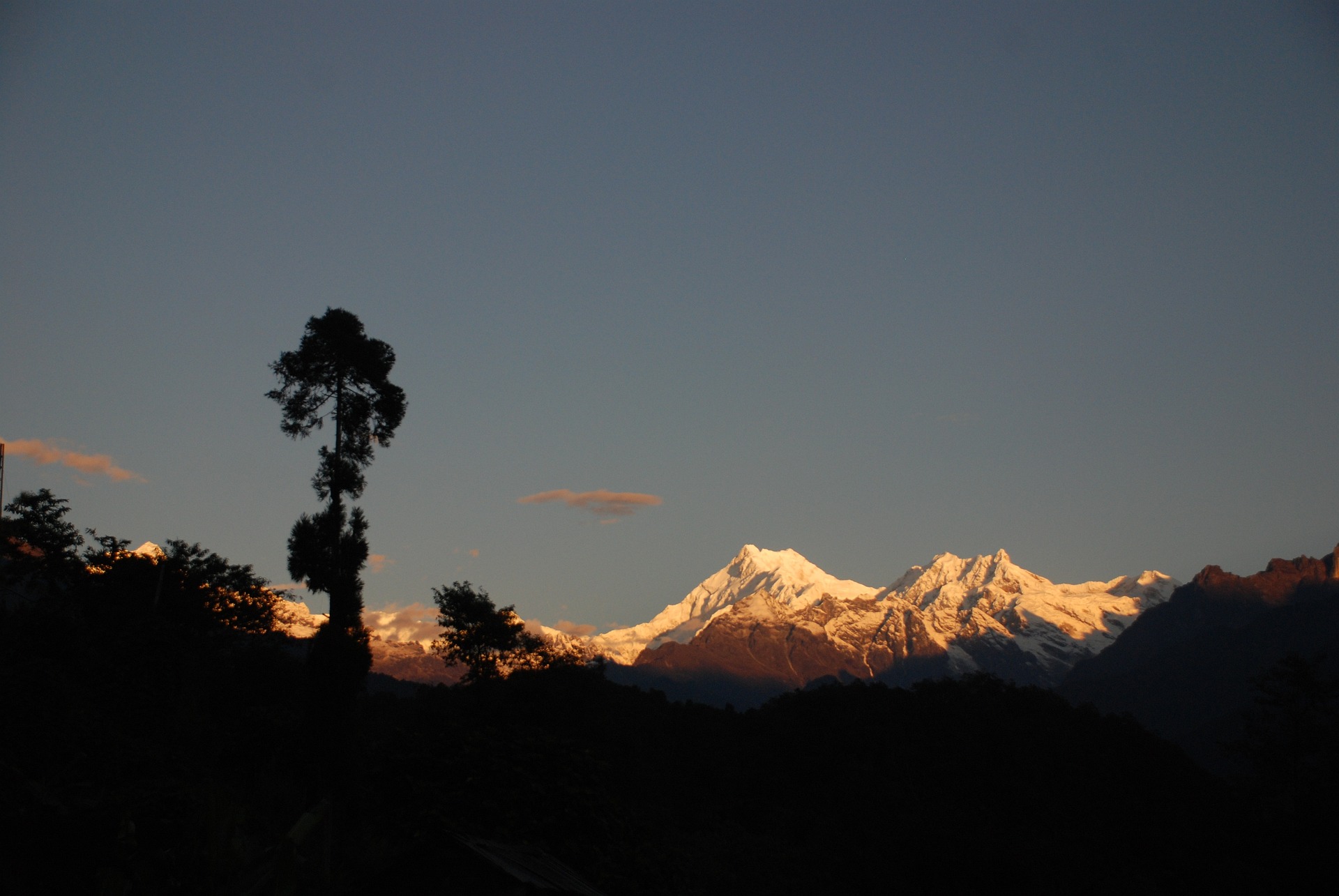
Day 12
Kanchenjunga is clearly visible and stunning. You cross the Yalung Ri glacier. At Oktang, you will be on a massive ridge that forms a cirque – a steep-walled, bowl-shaped mountain basin – that is more than nine miles long and always more than 25,000 feet. Kanchenjunga’s three main summits can be observed – a breathtaking mountain panorama.
Day 13
You will remain at a high altitude. Determination is called for. Crossing high passes is only possible in good weather – and with good logistics. Your abode for the night will be at Yalung Ri Base Camp.
Day 14
Traversing the Yalung Glacier, the walking is good.
Day 15
You will trek down a valley, then come to a pass that is rough and dangerous. After what begins as a steep climb with a number of false summits, you will reach Mirgin La. On the horizon are Everest, Jannu, Chamalung, Gyakung Kung, Lhotse and Makalu. To the south is the Terrai, a belt of marshy grasslands, savannahs, and forests that is a most worthwhile sight.
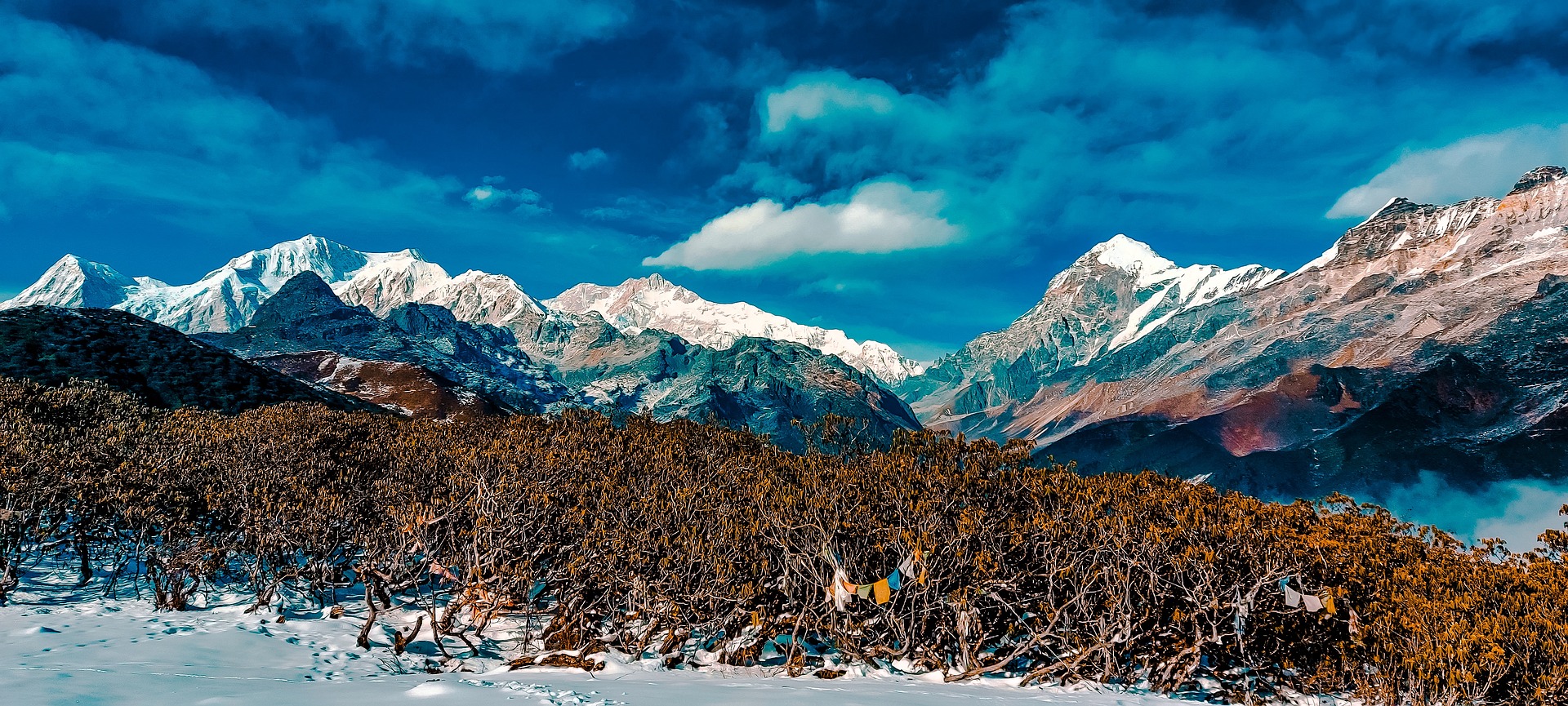
Day 16
Now, you will face four more passes, although there is little by way of descent between them. After lunch, you will descend to Lamba Sumba Kharka, replete with more views of the impassive southwestern face of Jannu. From here, the going is easy, and you will follow a pleasant, forested trail that brings you to Ghumsa, a picturesque village where prayer flags flutter from wooden houses and there are two monasteries. This is a most welcome sight after so many days in the wilderness.
A local speciality is tongba, an unusual alcoholic drink: boiling water is poured into a jug or large bamboo cup filled with fermented millet seed. It is drunk through a special straw. After walking for between four and six hours, you may wish to partake of this.
Day 17
South of Ghunsa Khola, the trail ascends. You will cross flood plains and emerge onto a pasture north of the river. There is a steep climb, and you will then cross a slide before descending to Lakepo. There is a short climb that puts you in the village of Kambachen.
Day 18
This day is devoted to acclimatisation. A day hike will take you to Jannu Base Camp. A shorter hike will allow you to explore the vicinity of Kambachen. Or you could catch up on your laundry. Or even read a book, so long as you brought a good one.
Day 19
A gentle climb through rocky fields puts you in Ramtang. You will cross northwest of the Kanchenjunga glacier to reach Lhorak, which is situated on a sandy plain close to a dry lakebed. There are beautiful mountain views in every direction. Water is scarce in Lhorak, so you should be abstemious. You will camp between boulders to protect yourself from the wind.
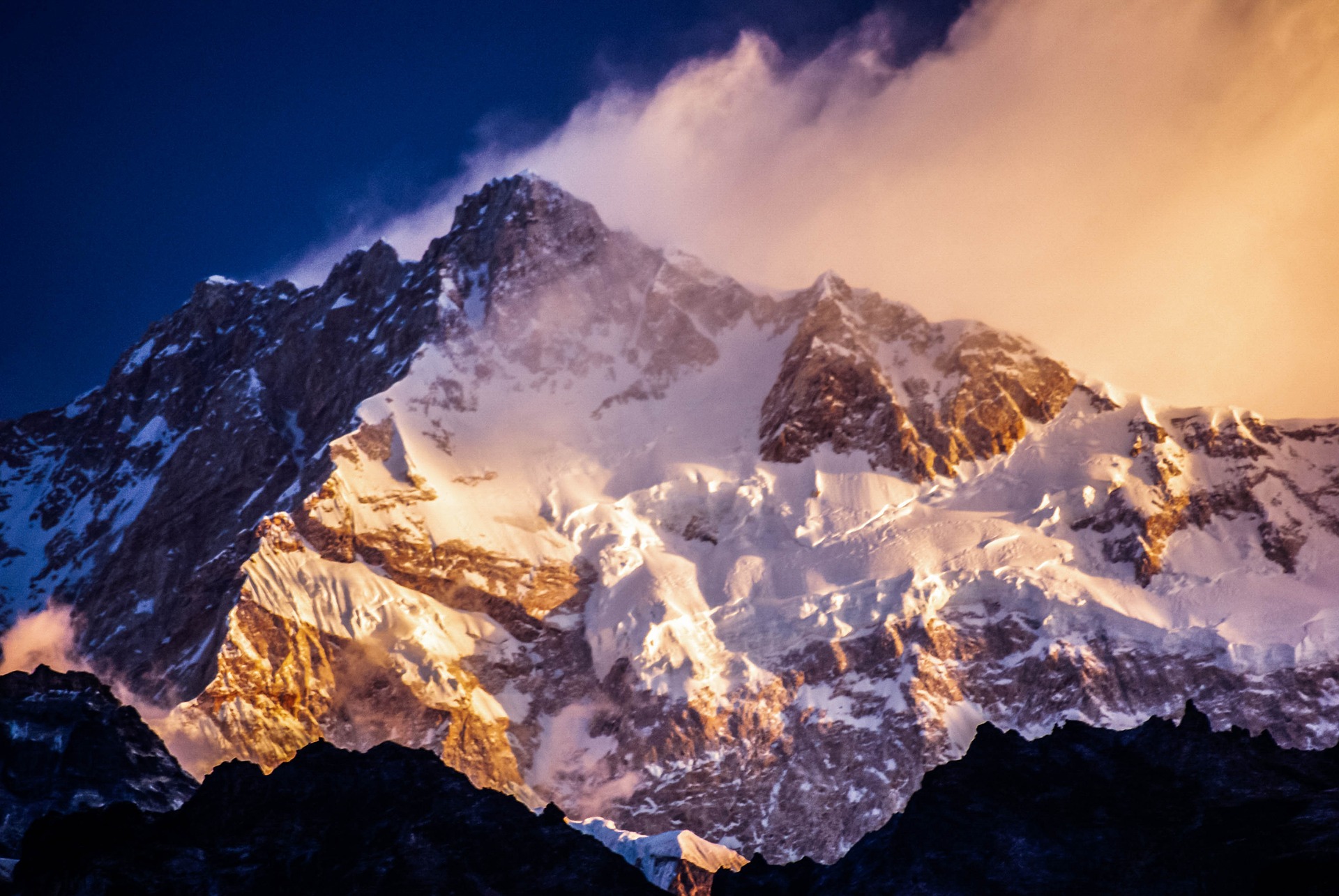
Day 20
From Lhorak, the path ascends slowly through a plain but later becomes steeper. This will get you to Pang Pema, the base camp for Kanchenjunga, which is 16,900 feet up. Since Biratnagar was only 266 feet high, you will have come a long way. Here, you will get the best view of the peak of Kanchenjunga.
Day 21
You will hike a few hundred feet up a ridge to the north of Pang Perma. This is a wonderful vantage point where Kanchenjunga, Tent Peak, the Twins and Wedge Peak stand before you. You will then descend to Kambachen.
Day 22
You will descend once more, this time through magnificent forest. You will pass Ghunsa and, an hour later, Phole, a village split into two sections, one of which is for Tibetan refugees. After that is Yangswa, where you will camp for the night.
Day 23
Today sees more lovely forest which soon turns into steep, grassy hillside. It is there that you will find Amjilosa.
Day 24
Now, you will have a short climb and then a radical descent, which consumes most of the day. Camp will be at the junction between the Tamur and Ghunsa Kholas.
Day 25
You will cross the Simbu Khola, which stems from Kanchenjunga’s southern base camp. It is pleasantly warm at such a low altitude – only 4,000 feet. Cardamom grows freely in this moist and shaded forest. You will cross a goodly number of small tributary streams to reach Chhirwa, a village surrounded by large boulders. Camp will be in a field before the village.
Day 26
You will encounter minor valleys and picturesque villages before reaching Suketar Airport late in the afternoon.
Day 27
Flying from Taplejung, you will have a final glimpse of the mountains with which you are now rather more familiar.
Day 28
You will return to Kathmandu.
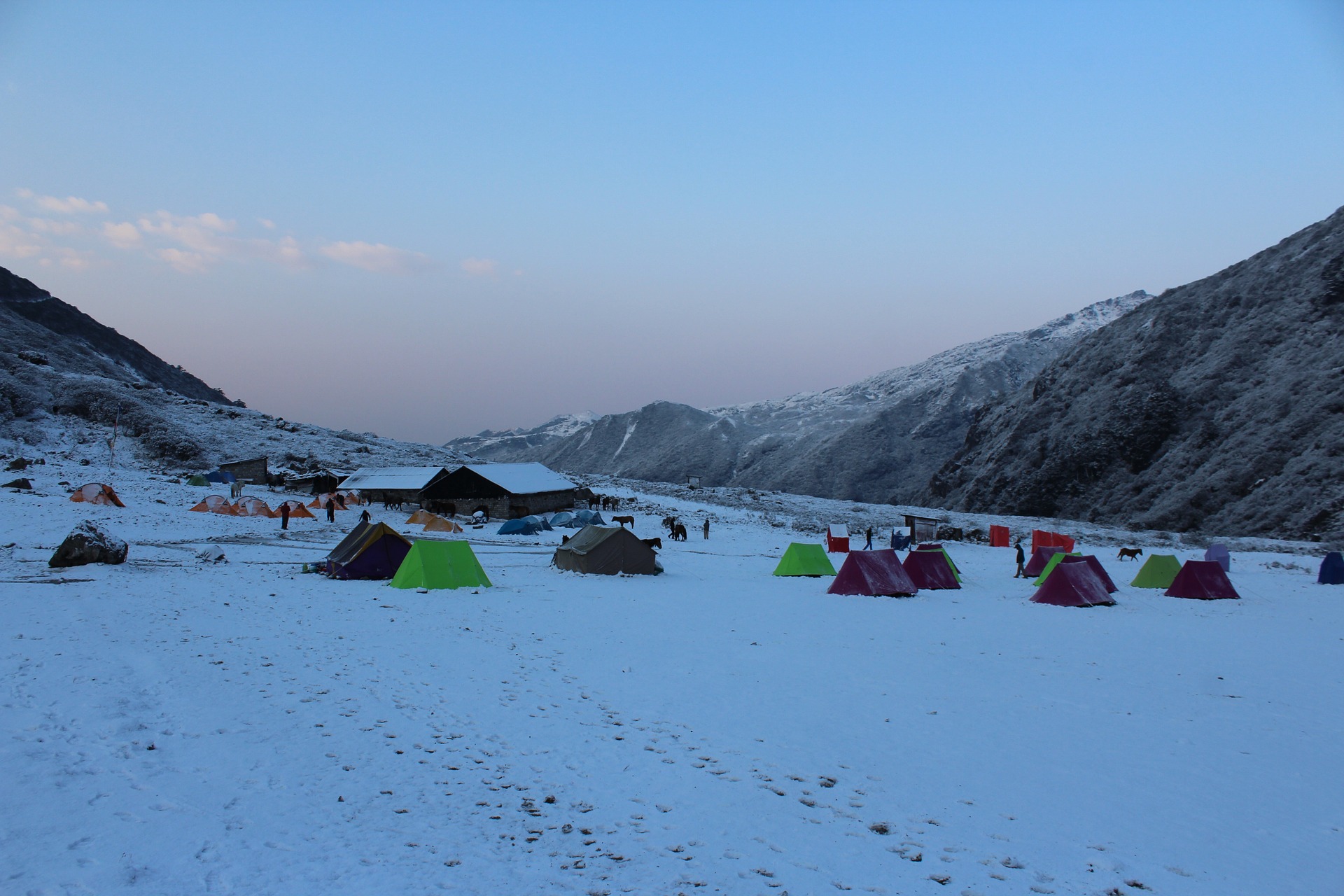
Kanchenjunga Base Camp Hike FAQ
How much does the Kanchenjunga Base Camp trek cost?
Costs for the Kanchenjunga Base Camp trek tend to be above $5,000, but there are some Nepal trekking companies who will run the trek for as little as $3,000.
Are permits required for the Kanchenjunga Base Camp trek?
Yes, a permit is required for the Kanchenjunga Base Camp Trek (a restricted trekking region) which costs $10 per person per week. This obviates the need for a Trekkers Information Management System card. There must be at least two trekkers in your party and a registered guide who will cost roughly $35 a day. You also must pay for entrance to the Kanchenjunga National Park which costs about $20.
When is the best time to trek Kanchenjunga?
The best time to trek Kanchenjunga are autumn and spring. Fall/Autumn is from September to November and is the best time for Nepal Trekking in general, while spring is from March to May.
Is altitude sickness a risk on the Kanchenjunga Base Camp hike?
Yes, there is some risk of altitude sickness on the Kanchenjunga Base Camp trek because it ascends to some high altitude points. At its highest point, Pangpema, you will reach an altitude of 5,030 meters (16,500 feet). There are steep sections on this trek where you will ascend very rapidly. It is important to have a clear understanding of the risks associated with high altitude trekking and how the body acclimatises to high altitudes.
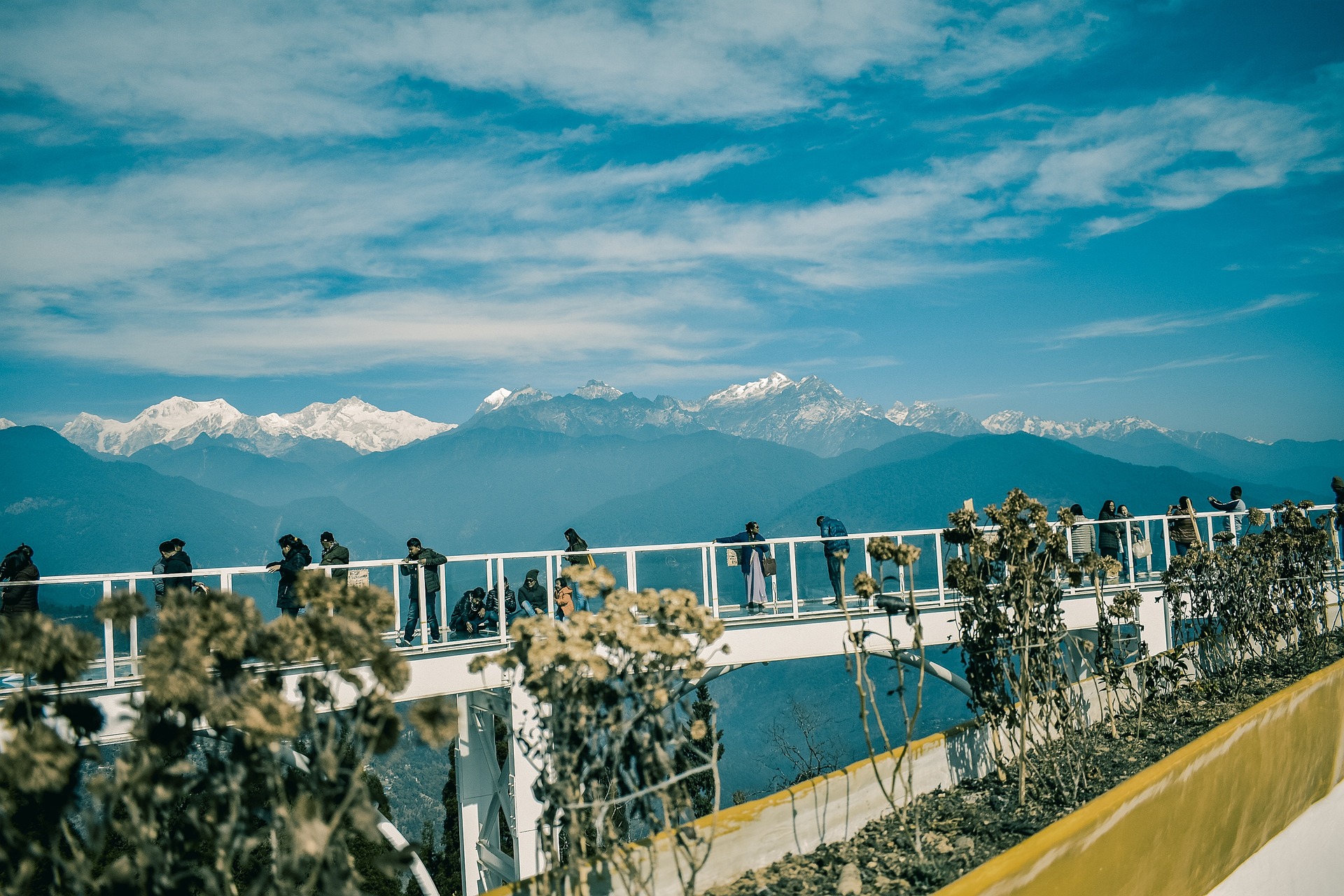
How difficult is the hike to Kanchenjunga Base Camp?
The Kanchenjunga Base Camp Trek is challenging. It is one of the longest treks in Nepal and requires constant hiking for over 3 weeks. You will need a good level of fitness and determination. There are some very steep sections and high-altitude points along the route that also make the trek a strenuous one.
Do I need insurance for the Kanchenjunga Base Camp Trek?
I recommend you get insurance coverage for the Kanchenjunga Base Camp hike. If an accident or incident should occur that requires immediate medical assistance and evacuation, you will most definitely want hiking insurance that can cover the costs of air ambulance and treatment.
Make sure you have trekking insurance for Nepal that covers you for any travel related risks, like lost, stolen, damaged or delayed baggage, interruptions and flight delays and tour operators' default.
Are there any recommended guidebooks for Kanchenjunga?
Yes, there are a few Kanchenjunga guidebooks that we highly recommend.
In terms of guidebooks, we recommend A Trekking Guide to the Nepal Himalaya: Everest, Annapurna, Langtang, Ganesh, Manaslu & Tsum, Rolwaling, Dolpo, Kangchenjunga, Makalu, West Nepal by Sian Pritchard-Jones, Bob Gibbons and the Himalayan Map House.
There are dozens of books about the Kanchenjunga region as well. For instance, there's Living on the Edge: The Winter Ascent of Kanchenjunga by Cherie Bremer-Kamp. Kanchenjunga gets a mention in Do What Thou Wilt: A Life of Aleister Crowley by Lawrence Sutin. In his novel, A Movable Feast, Hemingway described Crowley, an occultist, as the most evil man in the world; to be mentioned in a book about him is deeply flattering - not that a mountain will feel it.
See our recommended library of Nepal books and guidebooks for more options.
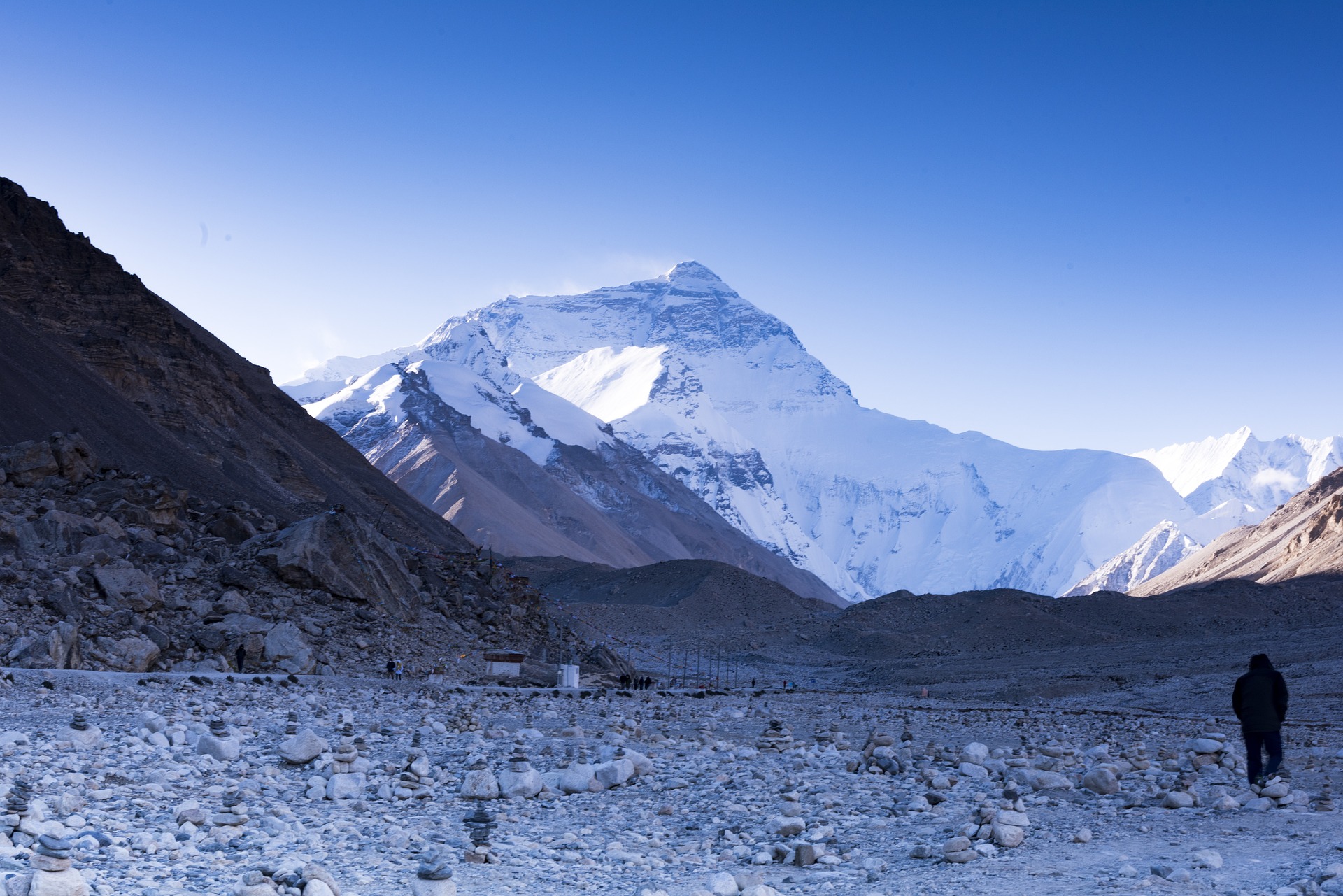
Are there are other Nepal trekking routes?
If the Kanchenjunga Base Camp Trek isn't your cup of tea, you can always try your hand at the Everest Base Camp hike, the Langtang Valley hike or the Manaslu Circuit hike. These treks are considered some of the best hikes in Nepal.
Continue browsing
See more information on Nepal. Or check out these other Nepal hiking articles:

